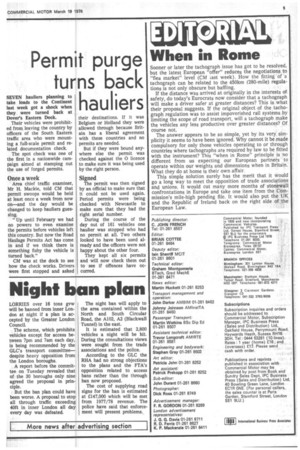Perm tu I purge ns back hauliers
Page 7

If you've noticed an error in this article please click here to report it so we can fix it.
SEVEN hauliers planning to take loads to the Continent last week got a shock when they were turned back at Dover's Eastern Dock.
Their vehicles were prohibited from leaving the country by officers of the South Eastern traffic area who were mounting a full-scale permit and related documentation check.
The spot check was one of the first in a nationwide campaign aimed at stamping out the use of forged permits.
Once a week
Area chief traffic examiner, Mr H. Mackie, told CM that permit swoops would be held at least once a week from now on—and the day would be changed to keep hauliers guessing.
"Up until February we had no powers to even examine the permits before vehicles left this country. But now the Road Haulage Permits Act has come in and if we think there is something fishy the vehicle is turned back."
CM was at the dock to see how the check works. Drivers were first stopped and asked their destinations. If it was Belgium or Holland they were allowed through because Britain has a liberal agreement with these countries and no permits are needed.
But if they were bound anywhere else the permit was checked against the 0 licence to make sure it was being used by the right person.
Signed
The permit was then signed by an official to make sure that it could not be used again. Period permits were being checked with Newcastle to make sure that they had the right serial number.
During the course of the day out of 161 vehicles one haulier was stopped who had no permit at all. Two others looked to have been used already and the officers were not happy about the other four.
They kept all six permits and will now check them out to see if offences have occurred.








































































































